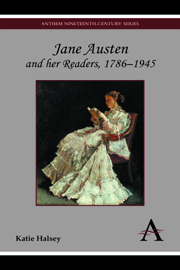Book contents
- Frontmatter
- Contents
- Acknowledgements
- Part One
- Part Two
- Introduction
- 4 Austen's Readers: Contexts I
- 5 Austen's Readers: Contexts II
- 6 Austen's Readers I: Affection and Appropriation
- 7 Austen's Readers II: Opposition and Resistance
- 8 Austen's Readers III: Friendship and Criticism
- 9 Austen's Readers IV: Sociability and Devotion
- Conclusion
- Notes
- Bibliography
- Index
9 - Austen's Readers IV: Sociability and Devotion
from Part Two
Published online by Cambridge University Press: 05 July 2012
- Frontmatter
- Contents
- Acknowledgements
- Part One
- Part Two
- Introduction
- 4 Austen's Readers: Contexts I
- 5 Austen's Readers: Contexts II
- 6 Austen's Readers I: Affection and Appropriation
- 7 Austen's Readers II: Opposition and Resistance
- 8 Austen's Readers III: Friendship and Criticism
- 9 Austen's Readers IV: Sociability and Devotion
- Conclusion
- Notes
- Bibliography
- Index
Summary
It is clear that, from their earliest incarnations, Austen's novels were read as family entertainment. Jane Austen's collection of opinions of Mansfield Park and Emma contains a number of comments which demonstrate that reading the books was a family activity. Austen records, for example, the views on Mansfield Park of ‘the families at Deane’ and ‘the Kintbury family’. These were communal opinions, arrived at after discussion. Austen's aunt and uncle, Mr and Mrs Leigh Perrot, similarly provided a joint opinion of Emma, as did Mrs Craven and her daughter, Austen's brother James and his wife, and ‘the family at Upton Gray’. As we have seen, the ‘morality’ and ‘good sense’ of Austen's work is commended in a number of these early responses, emphasizing the novels' suitability as books for families to read together. It is also noticeable how often the opinions of both Mansfield Park and Emma collected by Jane Austen focus on scenes of sociability and family life in those novels. Mrs Cage felt, on reading Emma, for example, that she was ‘at Highbury all day’, and could not ‘help feeling I have just got into a new set of acquaintance’. Admiration of Mansfield Park's ‘Portsmouth scene’ (in which, of course, Austen depicts the boisterous family life and sibling rivalries of the Price family) was recorded not only by the male readers already discussed in Chapter 5, but also by her niece, Anna Austen, sister-in-law Mrs James Austen, and friend Alethea Bigg, who found ‘the Price family at Portsmouth’ to be ‘delightful in their way’.
- Type
- Chapter
- Information
- Jane Austen and her Readers, 1786–1945 , pp. 189 - 208Publisher: Anthem PressPrint publication year: 2012

